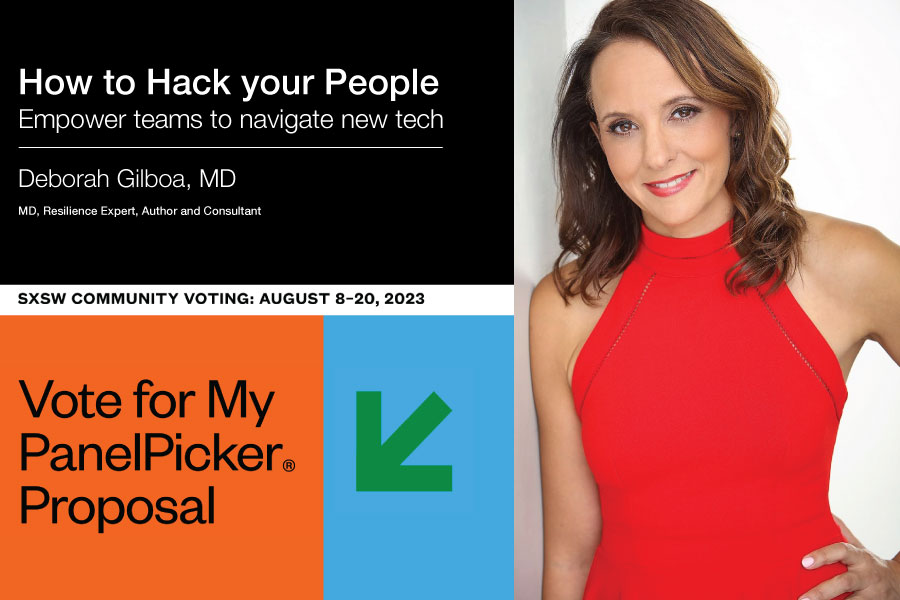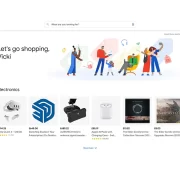Frustration, overwhelmed, irritability, withdrawal – all these are symptoms of too much stress. But stress isn’t a sign you’re doing life wrong, it’s a sign that you are living life! Resilience is the answer – the ability to navigate stress and use it to build the life you want.
We are thrilled to nominate the fascinating topic of How To Hack Your People – Empower Teams To Navigate New Tech, and Dr. Deborah Gilboa (aka Dr. G) for a wonderful speaking opportunity at SXSW 2024. In a rapidly evolving technological landscape, where stress and challenges can often feel overwhelming, we firmly believe that cultivating resilience is the key. This topic resonates deeply with our company’s values, as it underscores the importance of not just surviving but thriving amidst the complexities of modern life. With the ability to harness stress as a catalyst for growth, we are confident that this discussion will empower individuals and teams to navigate the dynamic world of technology while fostering a culture of resilience and innovation.
Sign in and help get this discussion on an international stage! Voting runs August 8th through August 20th!
VOTE here: https://panelpicker.sxsw.com/vote/134656

Q1: As a prominent resilience expert, Dr. Gilboa, can you teach us how to reframe stress, not as something to be avoided or eliminated but as a tool that can help us build our mental fitness and resilience, just as exercise builds our physical fitness?
Stress is painful, potentially damaging, and hard to handle, but it’s also the only way to get the life you want. Our brains interpret all change – the bad but also the good – as stressful. That’s because our brains protect the status quo at all costs.
Since the overriding purpose of the brain is to keep us alive – and we are currently alive! – the brain is skeptical of ALL change. When we encounter a change, the amygdala, a central area in the brain, releases chemicals that put us on high alert. When these chemicals are released, we fear loss, have distrust, and anticipate discomfort. Not only do these reactions happen when we hear we have a bad diagnosis from the doctor or that our job is in jeopardy. We experience these same reactions from winning the lottery or getting a job we want, or even going on vacation. All change releases stress hormones.
We’re told that stress is toxic and that we should avoid it as much as possible. However, the life we want requires change. A new job or a bigger home, or a better relationship. Watching our kids get older and helping our parents age well. Picking up a new hobby and going on that dream vacation. So we need to build our ability to navigate those stress chemicals, not avoid them.
If you want to be able to run a 10K, you have to start running. Even if you’re tired, even when it’s hard, even though you’re not yet ready for ten kilometers. In the same way, all of the changes you want to get to your goals require training and practice to be able to navigate the stress they will cause. Starting with smaller stressors, and learning the strategies that build your ability to handle those changes or resilience, will get you much closer to succeeding. Even when it’s hard, even when there are setbacks. Stress builds resilience very much as exercise builds fitness.
Q2: Stress is a fact of life, and it has an evolutionary purpose. You offer your attendees valuable and actionable strategies for developing strength and resilience, both professionally and personally, not in spite of challenges but because of them. Targeted to anyone interested in building the skills to intentionally navigate change and life’s curveballs, as well as lead others to do the same. It is all about “doing stress better”. So Dr. G, how can we “do stress better”?
In place of avoiding stress, we need to learn to curate our stress. To choose which stressors we will face, navigate, and “train on” and which we can avoid or eliminate. When we can choose our stressors – and some come to us with no choice at all – we can also choose how we approach them and what skills we build to navigate them. When we can’t choose our stressors, when they are unavoidable, no matter how painful or difficult, we can still choose how we approach them.
The tools exist to strengthen our resilience before we have to navigate a big change. The eight skills that make up resilience – the ability to build connections, set boundaries, be open to possibilities, manage discomfort, set goals, find options, take action and persevere – can be intentionally developed in anyone.
The strategies we need to handle the change we don’t choose or the changes that are harder than we pictured are also grounded in science and available when we need them.
We can’t avoid stress because it exists on our chosen paths. We can, however, do stress better and get the life by choosing our actions to align with our goals.
Cast your vote and support Dr. G’s presentation at SXSW 2024. VOTE and help get this discussion on a national stage. Voting runs through August 8 – 20th.
Details here: https://panelpicker.sxsw.com/vote/134656
Keep on reading...

Maximizing ROAS Through Measurable Marketing: A Guide for Small Business Owners
Maximizing ROAS through measurable marketing is not just about spending more but spending smarter. By avoiding common mistakes, debunking myths,

Riding the Pros and Cons of Integrating ERP Systems with E-commerce Platforms
ERP e-commerce integration refers to the process of connecting an e-commerce platform (e.g. WooCommerce) with an ERP system. This allows



